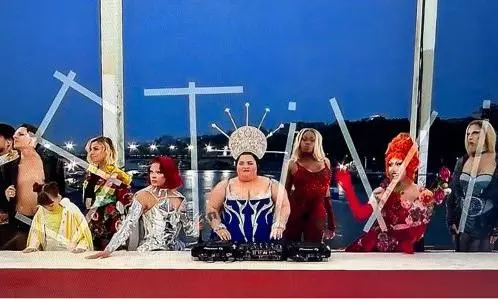Paris 2024 Olympics: Drag Queens Dazzle, Decapitate Marie Antoinette, and Leave Twitter in Tears

The grand tradition of turning the most innocuous events into global controversies continues as the Paris 2024 Olympics decided to rewrite the rulebook on cultural sensitivity. The opening ceremony, a spectacle typically reserved for national pride and athletic glory, instead featured a masterclass in stirring the pot and outraging the easily scandalized.
First, let’s set the scene: Paris, the city of romance, lights, and evidently, sacrilege. The opening ceremony was designed to dazzle, but it appears to have accomplished a more impressive feat—giving the world’s offended a reason to clutch their pearls and tweet furiously.
The pièce de résistance of this artistic extravaganza was a parody of Leonardo da Vinci’s iconic Last Supper. Ah yes, nothing says Olympic grandeur quite like a tableau that blends the sacred with the sensational. The high point—or low, depending on your perspective—was an ensemble of drag queens, including the notable likes of Nicky Doll and Paloma, staging what can only be described as a gloriously irreverent recreation of Christ's final meal.
According to the irate masses, this was a profound “lack of respect” for one of the most famous paintings in human history. European Parliament member Marion Maréchal expressed her disdain with the eloquence of someone who’s just discovered that their favourite soap opera has been replaced with a 24/7 stream of avant-garde performance art: “Difficult to appreciate the strange scenes between decapitated Marie Antoinette, a kissing troupe, drag queens, the humiliation of the Republican Guard forced to dance with Aya Nakamura, the ugliness of the costumes and the choreographies.”
But Maréchal wasn’t the only one to weigh in. Journalist Kyle Becker took to X (formerly Twitter) to blast the ceremony as “full Woke dystopian.” He was particularly disturbed by the visual imagery, accusing it of mocking everything from the Last Supper to the Book of Revelation. “The Olympics has made it clear that Christian viewers aren’t welcome,” Becker proclaimed, presumably as he awaited his invitation to join the Olympics' artistic board.
Not to be outdone, Kansas City Chiefs kicker Harrison Butker, perhaps more used to scoring field goals than cultural commentary, declared the visual “crazy” and quoted Galatians 6:7 in a show of biblical indignation: “Be not deceived, God is not mocked.” Butker was not scoring any points with the creators of the opening ceremony.
Then there was Riley Gaines, athlete and a self-styled expert on cultural appropriation, who declared: “Men in wigs front & centre at the Olympic Games. No one ever tells me this group is ‘oppressed’ or ‘marginalized’ again.” Gaines’ astute observation likely missed the memo that the Olympics is not a cultural sensitivity test, but rather a global celebration of diverse talents and performances.
While some were busy condemning the parade of gender-bending iconoclasm, others were celebrating it. Out magazine, ever the champion of LGBTQ+ visibility praised the "queens everywhere" for breaking through the mainstream and showing their talents to the entire world. It seems that for every scathing critique, there’s a jubilation of inclusivity.
The Paris 2024 Olympics have truly outdone themselves, not only by hosting a spectacle of Olympic proportions but by also mastering the art of cultural provocation. They’ve managed to offend, confuse, and inspire all in one go—an achievement that might just be worth a medal of its own. So, as we sip our coffee and digest the latest social media uproar, let’s remember that in the grand theatre of global events, sometimes the most shocking performances are the ones that make us question what we thought we knew about cultural propriety.
And for those still holding their breath over the sacrilege of it all, remember: in the world of art and entertainment, controversy is often the best kind of publicity.

